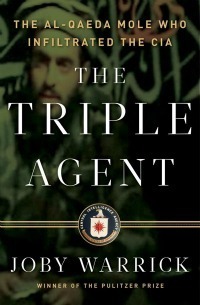Joby Warrick's 'Triple Agent'

Joby
Warrick, who used to sit next to me at the Washington Post, has a new book out on the guy who killed a bunch
of CIA operatives in Afghanistan in December 2009. Here is a short interview I
did with him about The
Triple Agent.
Best Defense: There have been a ton of books on
intelligence and al Qaeda over the last several years. What makes yours
different? Why should a hard-working stiff (or one of the many readers of this
blog currently deployed to Afghanistan) pay to download it?
Joby Warrick: Triple Agent is a different kind of read because it is, at its
core, a pure narrative, the story of an intelligence operation that unfolds
over the course of a year and then goes badly wrong. There's a lot of "news" in
the book, including an account of drone warfare that is as detailed, in my
humble opinion, as any in the open-source arena. But the reader is pulled along
by a story that is populated by unforgettable -- but very real -- characters and
races to its tragic climax. For those who closely follow CT, this review by the Brookings Institute's Ben Wittes
wonderfully distills what the book seeks to achieve: a penetrating and
informative reconstruction of a flawed intelligence operation that, to use Ben's
words, "bristles with the energy of a thriller."
BD: Did your research make you more or less pessimistic
about the Afghan war?
JW: I became less pessimistic about the
prospects for defeating "core" al-Qaeda in the Af-Pak region. The CIA's drone
campaign is extraordinarily effective, and the agency is getting progressively
better at targeting senior leaders and disrupting their networks. On the other
hand, my view of the war itself has not changed substantially. After spending
time in the east and meeting with ordinary Afghans there, it's hard to imagine
how a future Afghan government will retain control of provinces such as Khost
or Paktia once U.S. forces are gone.
BD: What has been the unofficial reaction of CIA types to
the book?
JW: I've had wonderful response from
individual CIA officers, including some who served at Khost and were present on
the day of the bombing. Many said they appreciated the book's straight-ahead
approach in telling the story, and the fact that, while pointing out fatal
mistakes that led to the bombing, the book is respectful of ordinary men and
women who served at Khost and worked under extraordinarily challenging
circumstances.
BD: How do you think
the CIA should change?
JW: After the bombing, the CIA owned up
to what then-director Leon Panetta described as "systemic" failures that contributed
to the great loss of life on Dec. 30, 2009. A key failure was an insufficient
focus on counterintelligence, which is an even tougher challenge at a time when
the intelligence agencies and operatives are strained by multiple rotations and
a decade of warfare. There also were mistakes that uniquely reflect the
circumstances and individuals at Khost. The CIA has implemented numerous
reforms, but a challenge for the agency is how to ensure proper attention and
follow-through, given the relative lack of transparency and oversight.
BD: What is the one question you'd like
to answer about the book that nobody has asked you?
JW: Some of the
events in the book have never been described elsewhere, and I've been surprised
that few reviewers or interviewers have asked about them. One favorite: a
description in the book of a dirty-bomb threat that emanated from Pakistan
mid-2009 and raised alarms at the highest levels of the U.S. government.
Information gleaned through SIGINT intercepts suggested strongly that the
Pakistani Taliban (TTP) had acquired "nuclear" material-presumably radioactive
sources useable in a dirty bomb--and were trying to decide what to do with it.
Concerns over a possible dirty-bomb attack directly factored into the decision
to take out TTP leader Baitullah Mehsud, who was killed in a drone strike on
Aug. 5 of that year. No radioactive material was subsequently found, and to
this day, no one knows what happened to it, or indeed, whether it ever existed.
Thomas E. Ricks's Blog
- Thomas E. Ricks's profile
- 436 followers



